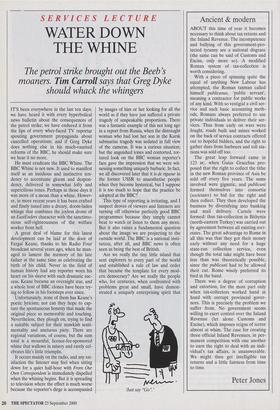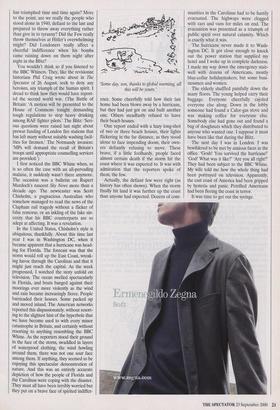SERVICES LECTURE
WATER DOWN THE WHINE
The petrol strike brought out the Beeb's should whack the whingers
IT'S been everywhere in the last ten days; we have heard it with every hyperbolical news bulletin about the consequences of the petrol strike; we have endured it from the lips of every whey-faced TV reporter spouting government propaganda about cancelled operations; and if Greg Dyke does nothing else in his much-vaunted reforms of the BBC, he should make sure we hear it no more.
He must eradicate the BBC Whine. The BBC Whine is not new. It used to manifest itself as an insidious and instinctive ten- dency to accentuate gloom and despon- dency, delivered in somewhat lofty and supercilious tones. Perhaps in those days it was more of a moan than a whine. Howev- er, in more recent years it has been crafted and finely tuned into a dreary, doom-laden whinge that combines the joyless drone of an EastEnders character with the sanctimo- nious self-righteousness of the welfare worker from hell.
A great deal of blame for this latest development can be laid at the door of Fergal Keane, thanks to his Radio Four broadcast several years ago, when he man- aged to lament the memory of his late father at the same time as celebrating the birth of his child. Never in the field of human history had any reporter worn his heart on his sleeve with such dramatic suc- cess. Keane became an overnight star, and a whole host of BBC clones have been try- ing to follow in his footsteps ever since.
Unfortunately, none of them has Keane's poetic lyricism; nor can they hope to cap- ture the spontaneous honesty that made the original piece so memorable and touching. Nevertheless, they plough on, trying to find a suitable subject for their mawkish senti- mentality and unctuous piety. There are regional variations, of course, but the sum total is a mournful, licence-fee-sponsored whine that wallows in misery and rarely cel- ebrates life's little triumphs.
It occurs mainly on the radio, and any sat- isfaction the listener may feel when sitting down for a quiet half-hour with From Our Own Correspondent is immediately dispelled when the whining begins. But it is spreading to television where the effect is much worse because the reporter's dirge is accompanied by images of him or her looking for all the world as if they have just suffered a private tragedy of unspeakable proportions. There was a fantastic example of this not long ago in a report from Russia, when the distraught woman who had lost her son in the Kursk submarine tragedy was sedated in full view of the cameras. It was a curious situation; but the anguished tones and contorted, tor- tured look on the BBC woman reporter's face gave the impression that we were wit- nessing something uniquely barbaric. In fact, we all discovered later that it is de rigueur in the former USSR to anaesthetise people when they become hysterical, but I suppose it is too much to hope that the practice be adopted at the BBC?
This type of reporting is irritating, and I suspect droves of viewers and listeners are turning off otherwise perfectly good BBC programmes because they simply cannot bear to watch or listen to them any more. But it also raises a fundamental question about the image we are projecting to the outside world. The BBC is a national insti- tution, after all, and BBC news is often seen as being the best of British.
Are we really the tiny little island that sent explorers to every part of the world and established a rule of law and order that became the template for every mod- ern democracy? Are we really the people who, for centuries, when confronted with problems great and small, have demon- strated a uniquely enterprising spirit that Just say "Go".' has triumphed time and time again? More to the point, are we really the people who stood alone in 1940, defiant to the last and prepared to throw away everything rather than give in to tyranny? Did the Few really throw themselves at Hitler's overwhelming might? Did Londoners really affect a cheerful indifference when his bombs came raining down on them night after night in the Blitz?
You wouldn't think so if you listened to the BBC Whiners. They; like the revisionist historians Phil Craig wrote about in The Spectator of 26 August, seek to deny any heroism, any triumph of the human spirit. I dread to think how they would have report- ed the second world war. (The Battle of Britain: 'A motion will be presented to the House of Commons tonight demanding tough regulations to stop heavy drinking among RAF fighter pilots.' The Blitz: 'Seri- ous questions were raised last night about prewar funding of London fire stations that has left many without suitable washing facil- ities for firemen.' The Normandy invasion: `MPs will demand the recall of Britain's troops until appropriate counselling services are provided.') I first noticed the BBC Whine when, as is so often the case with an all-pervading malaise, it suddenly wasn't there anymore. The occasion was a bulletin on Rupert Murdoch's nascent Sky News more than a decade ago. The newscaster was Scott Chisholm, a pugnacious Australian who somehow managed to read the news of the Clapham rail tragedy without a flicker of false remorse, or an inkling of the fake sin- cerity that his BBC counterparts are so adept at affecting. It was a revelation.
In the United States, Chisholm's style is ubiquitous, thankfully. About this time last year I was in Washington DC, when it became apparent that a hurricane was head- ing for Florida. The forecast was that the storm would roll up the East Coast, wreak- ing havoc through the Carolinas and that it might just reach the capital. As the week progressed, I watched the story unfold on television. The ocean swelled spectacularly in Florida, and boats banged against their moorings ever more violently as the wind and rain became increasingly fierce. People barricaded their houses. Some packed up and moved inland. The American networks reported this dispassionately, without resort- ing to the slightest hint of the hyperbole that we have become used to with every minor catastrophe in Britain, and certainly without resorting to anything resembling the BBC Whine. As the reporters stood their ground in the face of the storm, swaddled in layers of waterproof clothing, the wind howling around them, there was not one sour face among them. If anything, they seemed to be enjoying this spectacular demonstration of nature. And this was an entirely accurate depiction of how the people of Florida and the Carolinas were coping with the disaster. They must all have been terribly worried but they put on a brave face of spirited indiffer- `Some day, son, thanks to global warnzing, all this will be yours.'
ence. Some cheerfully told how their last home had been blown away by a hurricane, but they had just got on and built another one. Others steadfastly refused to leave their beach houses.
One report ended with a hazy long-shot of two or three beach houses, their lights flickering in the far distance, as they stood alone to face impending doom, their own- ers defiantly refusing to move. These brave, if a little foolhardy, people faced almost certain death if the storm hit the coast where it was expected to. It was with admiration that the reporters spoke of them, the few.
Actually, the defiant few were right (as history has often shown). When the storm finally hit land it was further up the coast than anyone had expected. Dozens of corn- munities in the Carolinas had to be hastily evacuated. The highways were clogged with cars and vans for miles on end. The evacuation was presented as a triumph of public spirit over natural calamity. Which is exactly what it was.
The hurricane never made it to Wash- ington DC. It got close enough to knock out the power station that supplied my hotel and I woke up in complete darkness. I made my way down the emergency stair- well with dozens of Americans, mostly blue-collar holidaymakers, but some busi- nessmen and women.
The elderly shuffled painfully down the many floors. The young helped carry their baggage. Everyone cheerfully cajoled everyone else along. Down in the lobby someone had found a Calor-gas stove and was making coffee for everyone else. Somebody else had gone out and found a bag of doughnuts which they distributed to anyone who wanted one. I suppose it must have been like that during the Blitz.
The next day I was in London. I was bewildered to be met by anxious faces in the office. 'Gosh! You survived the hurricane!' `God! What was it like?' Are you all right?' They had been subject to the BBC Whine. My wife told me how the whole thing had been portrayed on television. Apparently, the east coast of America had been gripped by hysteria and panic. Petrified Americans had been fleeing the coast in terror.
It was time to get out the syringe.























































































 Previous page
Previous page